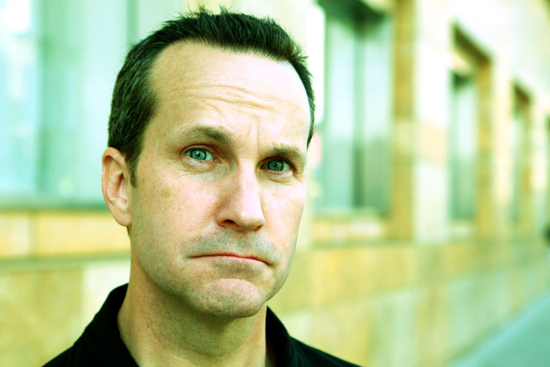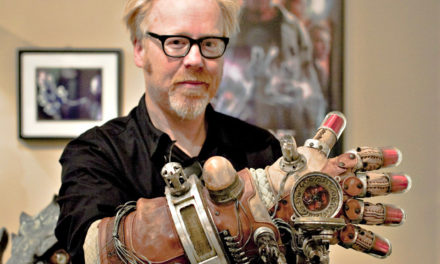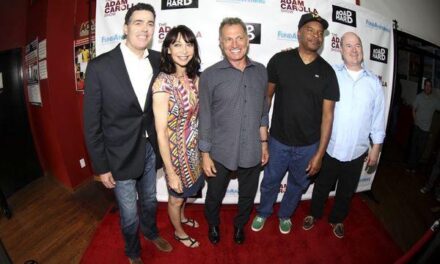Like most comedy podcasters, Jimmy Pardo has a background in stand-up. His career began in the mid ‘80s in Chicago, where his inclination for crowd work made him a natural at open microphones in some of the city’s bigger comedy venues.
Eventually, he made his way to Los Angeles. He quickly established himself as a talent there — a feat, to say the least. Due in part to a constant barrage of national shows, he also cemented his status as one of the country’s top club comics.
When I spoke with him, he was on his way to a water park with longtime friend and fellow comedy podcaster Paul Gilmartin.
As he braved LA traffic, he broke down his take on podcasting and “the pay wall,” as well as his work on Conan O’Brien’s show.
Pardo’s podcast, Never Not Funny, has been around since 2006. It stands as one of the first podcasts helmed by a comedian. In terms of listenership, it’s said to be the No. 2 paid comedy podcast behind Ricky Gervais’s.
“[Comedian] Todd Glass put it best,” says Pardo. “It may not have been the first [comedy podcast], but it’s been one since before people knew what a comedy podcast was.”
Pardo’s original idea was to record a live show and see how it sounded. “It didn’t really fly,” he says, “so we decided to do it more like a radio show.” The response was overwhelmingly positive. So much so that monetization became a viable option.
But taking the “pay wall” approach was not a decision he made without deliberation.
“I was torn between keeping it as just this fun way to entertain ourselves and monetizing it,” he says, “and there was a big backlash when we decided to charge money, because people were like: ‘hey the internet’s supposed to be free.’”
He also concedes he may have miscalculated the growth comedy podcasting would experience. “There were just a couple of comedy podcasts at the time,” he says, “and it didn’t seem like podcasts were taking off.
“Does it restrict our listenership, yes, very much so,” he says. “We put up the pay wall two years in, before the first comedy podcast boom happened. We’re staying very consistent as far as subscribers are concerned. But because of the pay wall we don’t grow at all. But I am very happy we made the decision to do what we’re doing.”
Podcasting is certainly not Pardo’s only gig. You may be familiar with his work on a little late-night program called Conan on TBS. Conan O’Brien was dead set on having the celebrated club comic as a warm-up act when his show entered its Tonight Show incarnation.
Pardo continues to look at his time with Conan as nothing but a great experience. But initially, he was unsure as to whether it was the right decision:
“I went back and forth on whether I should do it,” he says. “I didn’t want to be a warm-up comic; that’s not what my dream was. But it was The Tonight Show, and it was Conan O’Brien, so I thought you know I better take that meeting.
“The thing that really changed things for me was that they wanted me. They said ‘if you don’t want this job, we don’t know what we’re going to do.’ They said, ‘you’re the guy we want.’ At that point, I decided I at least have to try this.”
Recently, his success as a warm-up, as well as his rapport with Conan, earned him a guest-hosting spot on Conan.
“I was honored,” he says. “They could’ve gone with a celebrity, and there were other people around who’d been on the show longer, but Conan was like ‘I have great chemistry with Jimmy, so let’s just do it with him.’”
Despite his accolades on the small screen, he continues to do stand up, and just recently released his third CD, Sprezzatura. He says he has no intention of leaving the podcast game. In addition to Never Not Funny, he’s a frequent guest on other big shows, including Comedy Bang Bang, Doug Loves Movies, WTF, and Nerdist.
His skepticism about the future of the medium, as far as comics are concerned, is no secret, though. One could say, he’s cautiously optimistic.
“I worry a little bit that it’s going to be like the comedy boom of the late ‘80s,” he says.” “There are going to be so many comedy podcasts out there that the market is going to become saturated.
“At the same time, I do believe that the cream will rise to the top. The good one’s will stick around, and the one’s that aren’t so hot will fall off. I don’t want to try and look too far in the future, but right now it looks like it can become an economically-viable form of entertainment.”
There’s little doubt Jimmy Pardo is one of those podcasters, who will “rise to the top.” The question is: Is the top of comedy podcasting where he wants to be?”
You can follow Jimmy on Twitter @NeverNotFunny and pick up his latest CD at pardcast.com.






